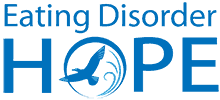By Crystal Karges
RDN, IBCLC on behalf of Eating Disorder Hope
This is a contributing article from Eating Disorder Hope to The Denisonian to assist in educating our academic community
Regardless of where you might be in your college career, you have likely experienced the challenges, excitement, and considerable opportunities that come with this period in your life. While the years spent in college open the potential for greater independence, responsibility, and self-discovery, this phase of your life could also bring about more intense obstacles and stressors with the new transitions and demands that come along with being a college student.
The transition to college can be anxiety-provoking for many reasons, such as increased pressures to achieve academically, intensified peer pressure, homesickness or feelings of isolation, greater financial responsibilities, or even the experience of traumatic events. For individuals who lack appropriate coping skills, this transition period can ignite the slow demise of emotional security. This vulnerability sets the perfect stage for the development of an eating disorder, which often progresses as a means of coping with stressful situations while providing a false sense of control in chaotic situations. Unfortunately, eating disorders are becoming more prevalent among college students, with research data showing an increase in eating disorders from 23 to 32% among females and from 7.9 to 25% among males [1].
As a college student who may be facing these vulnerabilities at some point in your academic career, what are important things to be aware about eating disorders?
- Be Informed: Eating disorders are the mental illnesses with the highest mortality rate. Learn more about the warning signs of Anorexia and Bulimia. If you believe that you or a close friend might be struggling with an eating disorder, voice your concerns and reach out for help. Early detection, intervention, and treatment are essential to improving outcomes for recovery.
- Get Connected: Eating disorders are isolating diseases, and it can be difficult to reach out for help and support when you are struggling. Be aware of the mental health services that are offered for students on your campus or any other resources that can sustain your overall well-being. Having a strong support system can bolster your ability to overcome difficult times you may encounter.
- Build Positive Coping Skills: Eating disorders may synthesize a sense of security, but the reality is that these feelings of control are false. It is inevitable that you will face stressful and difficult times throughout college. Be better prepared to face these events by developing positive coping skills. Whether it be engaging in physical activity, confiding in close friends, or taking time out for relaxation and self-care, having constructive ways of handling stress will help you overcome obstacles throughout your journey
Eating disorders are a reality that an increased number of college students are facing, many who are suffering alone and without adequate support. If you are struggling with an eating disorder, take a step towards getting the appropriate care you need by reaching out for help. Your college years have the potential to be some of the best of your life, and an eating disorder will only hamper the possibilities that await you. For more information and treatment resources, visit www.eatingdisorderhope.com
References:
[1]: White, S, Reynolds-Malear, J, Cordero, E., “Disordered Eating and the use of Unhealthy Weight Control Methods in College Students: 1995, 2002 and 2008”. Eating Disorders – Journal of Treatment and Prevention: Volume 19 Number 4 July- September 2011.

